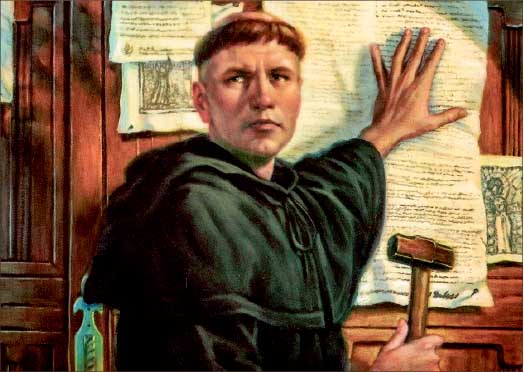Learning from the past

Christians ought to be educated and informed about the history of the faith
Every Oct. 31, kids all around the country dress up in various costumes and parade around their neighborhoods, filling their bags to the brim with candy. However, Oct. 31 is about more than just Halloween; it is the day we remember the beginning of the Reformation. The Reformation, which began with Martin Luther’s presentation of his 95 theses, revolutionized the spiritual life of Europe and is the foundation for everything we experience in Christianity today. Our churches, governments and societies would look completely different if the Reformation had not happened.

REFORMATION — Martin Luther’s posting of the 95 theses was a monumental turning point for the Christian faith. Google Images
Yet looking back and appreciating those who have come before us is not a part of our culture today. This is true of the church as a whole but is also reflected in the culture around us that is so willing to discard the old and accept the new.
“The newer is truer, only what is recent is decent, every shift of ground is a step forward, and every latest word must be hailed as the last word on its subject,” the great theologian J.I. Packer wrote, describing this mindset.
C.S. Lewis terms this as “chronological snobbery.”
Lewis writes that it is “the uncritical acceptance of the intellectual climate common to our own age and the assumption that whatever has gone out of date is on that account.”
This is a concept Christians specifically should flee from. Paul, in Ephesians 2:20, is very clear that the Church has “been built on the foundation of apostles and prophets (NLT).”
Christians should be studying and learning from the history of the Church.
The study of Church history is so important, first and foremost, because it brings perspective to our faith. Christianity was not established in a vacuum but has a rich and deep context. As we look back through our past we come to understand the prices many people paid for the doctrines that we hold so lightly today. Men like William Tyndale died in 1536 because of their attempts to translate the Bible into common vernacular.
Understanding the history of Christianity also informs us of errors of the past and how Christians responded to them. The phrase from Ecclesiastes 1:4, “there is nothing new under the sun (NIV),” perfectly describes the attacks from inside and outside the Church throughout history. We should not be fooled into thinking the struggles of our present time — a postmodern rejection of absolute truth — are new and have never been discussed. Christians who lived in the late Roman Empire provide a perfect model for enduring suffering from and living in a nation hostile to Christian faith.
Finally, Church history can provide encouragement as we look at the lives of past heroes. If you are worried about leaving your country and family behind to go to a foreign land for missions, there is no one better to study than William Carey, the father of modern missions. If you are concerned about starting into ministry out of college at such a young age, Robert Murray McCheyne’s short but impactful time as a pastor will be an encouragement. Lastly, if you are concerned about faithfully holding to your convictions in the public square, Eric Liddell, the great Scottish runner, is a model to follow.
God has blessed us today with many great pastors, thinkers and worship leaders, yet he has also blessed us with the writings of or about many of the great leaders of the past. We should be wary of falling into the trap of “chronological snobbery.”
SUTHERLAND is the opinion editor.

Hi there, You have done a great job. I’ll definitely digg it and personally recommend to my friends.
I’m confident they will be benefited from this site.